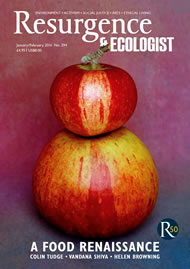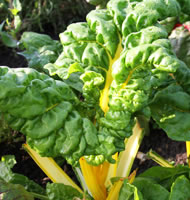When a young Japanese agronomist, Shinya Imahashi, started his small Natural Agriculture demonstration farm near Yatesbury in Wiltshire, he invited organic farmers to hear about the way he works. His visitors were interested, but they warned him that, unless he fed his soil or used rotation, within five years many of his crops would fail. Six years on, his vegetables are thriving and taste delicious.
This is what Shinya Imahashi does: after sowing seeds he’s saved himself, he puts his trust in the soil, he says. He neither feeds it nor rotates his crops. He observes the growing process closely, but otherwise intervenes as little as possible. Shinya is a member of the Shumei movement of Japan, and he believes that this way of growing food will improve our health and lead us towards World Peace.
However loudly we might voice our respect for Nature’s intelligence, we’re reluctant to rely on it when it comes to growing food, whether on a commercial or an amateur basis. Instead we act as if the soil had little life of its own. But perhaps the time has come to allow Nature to show us the way. The worldwide and slowly expanding network of Shumei Natural Agriculture farmers believe that it has. While the simplicity of their methods may challenge our deeply entrenched ideas, their results are impressive. Perhaps trusting in the power of the soil could be of greater help to us than we imagine.
The ideas behind the Shumei approach to agriculture began with the Japanese philosopher and naturalist Mokichi Okada (1882–1955). They were part of a wider vision he developed during the 1930s of a world transformed through our collective effort into one of truth, virtue and beauty. An important element in this transformation was the restoration of our relationship with Nature. The best way to do this, he advised, was to learn, through our food growing and consuming, to partner rather than control the soil.
One way to approach Shumei Natural Agriculture is to see it as an extension of the ideas behind permaculture and organic growing. It takes respect for the soil one step further. Unlike the organic method, it encourages growers to avoid crop rotation. Unlike permaculture, it advises them not to fertilise their soil, no matter how sustainable the process.
There are no rules about watering, weeding or tilling. It’s believed that every piece of land is different and that each grower will develop a unique understanding of what is needed based on his or her own observations.
However, if the soil is dry, mulching with leaves and grass clippings from around the planting area is encouraged. The thinking behind this is important. The grower’s intention is to keep the soil moist and soft rather than to feed it. Practitioners demonstrate in their thoughts and actions that the soil is capable of feeding itself.
After five years of trusting the Wiltshire soil to grow his crops, Shinya sent a soil sample from his potato patch to NRM Laboratories for analysis. The results were as he expected. Rather than depleting its vitality, continuous cropping with potatoes had improved the soil’s health and microbial activity. Not only that, but the potato harvest had increased during every one of those five years. Why were the results contrary to those we’ve been taught to expect?
Mokichi Okada’s answer might have been that it is because we’ve forgotten the power of the soil. He advised his students that any initial success with feeding the soil is temporary. In the long term, fertiliser weakens the soil and damages seeds, plants and our health. If, on the other hand, we recognise that the soil has everything it needs and allow it to build a relationship with the same crop year after year, it is revitalised. The seeds collected grow healthier with each generation and develop into plants better able to resist disease and extremes of climate.
Shumei practitioners in Japan suggest that growing crops by this method may also improve their shelf life, citing photographic evidence appearing to show that after two weeks of storage in sealed containers, vegetables grown without fertiliser of any kind lasted longer than those grown by conventional organic or non-organic methods.
However intriguing this may sound, switching from our current way of growing to Shumei Natural Agriculture can take a season or two. The Japanese philosopher’s warning was that crops grown from seeds weakened by years of soil feeding take time to recover their inherent ability. The soil also needs to free itself of dependence on fertilisers.
For large numbers of the world’s small farmers this method could offer a lifeline. One Zambian women’s food-growing collective near Lusaka was quick to spot its benefits. In common with many other farmers, its members had been persuaded to feed their families by buying hybrid seeds and fertiliser they could little afford. In time they found themselves caught in a poverty trap with no obvious means of escape. They now grow indigenous crops from seed they produce and collect themselves and without the need for expensive fertilisers. News of their success has spread and now there are close to 6,000 Shumei Natural Agriculture small farmers in Zambia.
Elsewhere in the world, farmers find themselves caught in a rather different trap. Consumers’ disconnection from Nature and their consequent lack of knowledge about the growing process have led to unrealistic demands that farmers struggle to fulfil.
Shumei’s founder was acutely aware of these difficulties and recommended that consumers take a more active role in food growing. In Japan, consumers of Shumei produce volunteer in the fields where their food is grown. They have begun to appreciate the complex role of Nature in the food-growing process, and a relationship based on cooperation and understanding has built up between them and their farmers.
As we might expect, since reconnecting with the soil and the food they eat, these consumers report an improvement in their quality of life. It’s rather more surprising to learn of the many testimonials the organisation has received about reductions in food allergies. This alone makes trusting in the power of the soil worthy of further investigation.
For more information on Shumei Natural Agriculture: www.shumei-na.org








